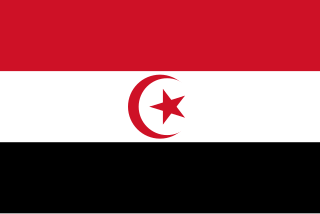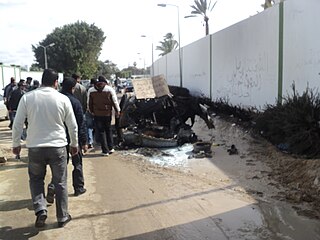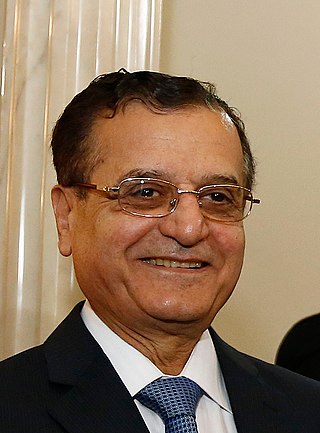
The politics of Libya has been in an uncertain state since the collapse of the Libyan Arab Jamahiriya in 2011 and a recent civil war and various jihadists and tribal elements controlling parts of the country. On 10 March 2021, the interim Government of National Unity (GNU), unifying the Second Al-Thani Cabinet and the Government of National Accord was formed, only to face new opposition in Government of National Stability, until Libyan Political Dialogue Forum assured the ongoing ceasefire.

The Arab Islamic Republic was a proposed unification of Tunisia and Libya in 1974, agreed upon by Libyan head of state Muammar Gaddafi and Tunisian President Habib Bourguiba. Additional countries—Morocco and Algeria—were later included in the proposal, which was never implemented.

The Public Scout and Girl Guide Movement is the national Scouting organization of Libya. It was founded in 1954, and became a member of the World Organization of the Scout Movement in 1958 and of the World Association of Girl Guides and Girl Scouts in 1981. The coeducational Public Scout and Girl Guide Movement has about 18,500 members as of 2004.

Wanis al-Qaddafi was a Libyan politician. He held many positions in the era of the Kingdom of Libya and was the tenth Prime Minister of Libya from 4 September 1968 to 31 August 1969, when his government was overthrown by Muammar Gaddafi.

Abdessalam Jalloud is the former Prime Minister of Libya. His tenure lasted from 16 July 1972 to 2 March 1977, during the government of Muammar Gaddafi. He was also Minister of Treasury from 1970 until 1972.

Mansour Rashid Kikhia was the Libyan Minister of Foreign Affairs (1972–1973), Libyan Ambassador to the United Nations, Permanent Libyan Representative to the United Nations (1975–1980), and later an opposition figure to Libya's leader Muammar Gaddafi, and human rights activist.
The Qadhadhfa is one of the Arab Ashraf tribes in Libya, living in the Sirte District in present-day northwestern Libya. They are traditionally counted amongst the country's Ashraf tribes, and during the Gaddafi regime were regarded as being one of the greatest and most powerful tribes in the whole country. They are now mostly centered at Qasr Abu Hadi, Sirte.

Abdul Fatah Younis Al-Obeidi was a senior military officer in Libya. He held the rank of major general and the post of minister of interior, but resigned on 22 February 2011 to defect to the rebel side in what was to become the First Libyan Civil War. He was considered a key supporter of Muammar Gaddafi or even No. 2 in the Libyan government.

The National Transitional Council (NTC) was a transitional government established in the 2011 Libyan civil war. The rebel forces overthrew the Libyan Arab Jamahiriya of Muammar Gaddafi. The NTC governed Libya for a period of ten months after the end of the war, holding elections to a General National Congress on 7 July 2012, and handing power to the newly elected assembly on 8 August.

United Nations Security Council Resolution 1970 was a measure adopted unanimously by the UN Security Council on 26 February 2011. It condemned the use of lethal force by the government of Muammar Gaddafi against protesters participating in the Libyan Civil War, and imposed a series of international sanctions in response.
Omar Mokhtar El-Hariri was a leading figure of the National Transitional Council of Libya who served as the Minister of Military Affairs in 2011, during the Libyan Civil War. He controlled the National Liberation Army and the Free Libyan Air Force from March to May 2011. He served on the council Executive Board before being replaced by Jalal al-Digheily, and he headed Military Affairs in the unicameral National Transitional Council legislature.
Mansour El-Kikhia may refer to:
Mansour Dhao Ibrahim is a Libyan former politician. He was a prominent figure in the Gaddafi government, serving as Muammar Gaddafi's chief of security until they were both captured. Dhao was the leader of the regime's People's Guard. He is Gaddafi's cousin.

The killing of Muammar Gaddafi took place on 20 October 2011 after the Battle of Sirte. Muammar Gaddafi, the deposed leader of Libya, was found west of Sirte after his convoys were attacked by NATO aircraft, as part of the 2011 NATO military intervention in Libya. He was then captured by National Transitional Council (NTC) forces and killed shortly afterwards.
The international reactions to the killing of Muammar Gaddafi concern the responses of foreign governments and supranational organisations to the killing of former Libyan leader Muammar Gaddafi at the Battle of Sirte, the last major engagement of the 2011 Libyan civil war, on 20 October 2011.

Adnan Mansour is a Lebanese diplomat, politician and the former minister of foreign affairs and emigrants.

Ahmed Gaddaf al-Dam is the cousin and aide of former Libyan leader Muammar Gaddafi. He is Libya's former Special Envoy to Egypt and a leading figure of the Gaddafi regime. He was a key member of Gaddafi's inner circle.

Nuri al-Mismari is the former Chief of Protocol of Libyan dictator Muammar Gaddafi and one of his closest aides. He was a key member of Gaddafi's inner circle and served under him for 40 years.
Abdel Moniem al-Taher al-Houni, also transliterated as Abdul Munim el-Huni, is a Libyan military officer, diplomat, and politician. He was one of the original twelve members of the Libyan Revolutionary Command Council and briefly served as Minister of Foreign Affairs from 1974 to 1975.
This page is based on this
Wikipedia article Text is available under the
CC BY-SA 4.0 license; additional terms may apply.
Images, videos and audio are available under their respective licenses.











